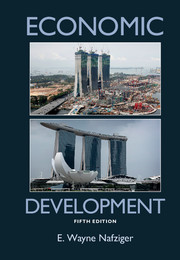Book contents
- Frontmatter
- Contents
- Preface to the Fifth Edition
- Abbreviations and Measures
- Part One. Principles and Concepts of Development
- Part Two. Poverty Alleviation and Income Distribution
- Part Three. Factors of Growth
- Part Four. The Macroeconomics and International Economics of Development
- 14 Monetary, Fiscal, and Incomes Policies and Inflation
- 15 Balance of Payments, Aid, and Foreign Investment
- 16 The External Debt and Financial Crises
- 17 International Trade
- Part Five. Development Strategies
- Glossary
- Bibliography
- Index
- Endpapers
15 - Balance of Payments, Aid, and Foreign Investment
from Part Four. - The Macroeconomics and International Economics of Development
Published online by Cambridge University Press: 05 June 2012
- Frontmatter
- Contents
- Preface to the Fifth Edition
- Abbreviations and Measures
- Part One. Principles and Concepts of Development
- Part Two. Poverty Alleviation and Income Distribution
- Part Three. Factors of Growth
- Part Four. The Macroeconomics and International Economics of Development
- 14 Monetary, Fiscal, and Incomes Policies and Inflation
- 15 Balance of Payments, Aid, and Foreign Investment
- 16 The External Debt and Financial Crises
- 17 International Trade
- Part Five. Development Strategies
- Glossary
- Bibliography
- Index
- Endpapers
Summary
Dambisa Moyo, a Zambian-born economist, with an Oxford doctorate, a previous World Bank consultancy, and a decade of employment at Goldman Sachs, is author of the critically acclaimed Dead Aid: Why Aid Is Not Working and How There Is a Better Way for Africa (2009a). She attacks the traditional Western aid enterprise and its never-ending vicious cycle, with the inevitable domestic corruption amid the high-stakes rent seeking for control of access to the aid, the increased poverty that ensues, and the subsequent efforts by aid-dependent elites to start the cycle again to support their positions and lifestyles. Africans are poorer because of aid, she contends. She offers assorted solutions, some from the prevailing development literature: Grameen Bank–style peer borrowing, clear property rights (a la de Soto), avoiding Dutch disease, exploiting the international bond markets instead of the “free” money of aid givers, and economic incentives aligned with social costs and benefits. She advocates “shock therapy,” an abrupt transition to a market-based self-sufficiency paradoxically inspired by both Chinese examples of pulling itself up by its “bootstraps” and “launch[ing] an aggressive investment assault across the [African] continent” (Moyo 2009b).
Some may charge her with overstating Asia's development success during the late twentieth century or wearing rose-colored glasses when viewing the Chinese model. But undoubtedly she has touched a raw nerve among the Western aid establishment.
- Type
- Chapter
- Information
- Economic Development , pp. 486 - 531Publisher: Cambridge University PressPrint publication year: 2012



